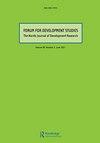‘State-Security First’ and the Militarization of Development: Local Perceptions on Post-Conflict Reconstruction Policies in Pakistan’s Tribal Areas (2015–2019)
IF 1.1
Q3 DEVELOPMENT STUDIES
引用次数: 5
Abstract
Abstract In the post-military operation scenario, the government of Pakistan (GoP) has launched reconstruction interventions under the notion of ‘build back better and smarter’. This article critically evaluates the reconstruction efforts (2015–2019) using local perceptions to attest as to what extent reconstruction interventions have been participatory and how they have been received by local communities in terms of their contextual needs. Primary data was collected during 2017–2019 in North Waziristan (NW) through semi-structured interviews, informal discussions and participant observation with local and key respondents. The study found that although interventions were designed predominantly to improve development outcomes and build connections between local community and the state, the ‘state-security first’ paradigm reigns over the ‘positive security’ of the affected population. Interventions were centrally planned without proper participation or even taking into account local needs and grievances. The article argues that instead post-conflict reconstruction policies and practices should focus on well-assessed micro-needs, confidence-building approaches and the participation of local communities in order to achieve the desired goals of positive security and sustainable development.“国家安全第一”与发展军事化:巴基斯坦部落地区冲突后重建政策的地方认知(2015-2019)
摘要在军事行动后的情况下,巴基斯坦政府(GoP)在“重建得更好、更聪明”的理念下启动了重建干预措施。本文批判性地评估了重建工作(2015-2019),使用当地的认知来证明重建干预措施在多大程度上是参与性的,以及当地社区如何根据其背景需求接受这些干预措施。2017年至2019年,通过半结构化访谈、非正式讨论以及与当地和主要受访者的参与者观察,在北瓦济里斯坦(NW)收集了主要数据。研究发现,尽管干预措施主要旨在改善发展成果,并在当地社区和国家之间建立联系,但“国家安全第一”的模式主导着受影响人口的“积极安全”。干预措施是集中规划的,没有适当的参与,甚至没有考虑到当地的需求和不满。文章认为,冲突后重建政策和做法应侧重于经过充分评估的微观需求、建立信任的方法和当地社区的参与,以实现积极安全和可持续发展的预期目标。
本文章由计算机程序翻译,如有差异,请以英文原文为准。
求助全文
约1分钟内获得全文
求助全文
来源期刊

FORUM FOR DEVELOPMENT STUDIES
DEVELOPMENT STUDIES-
CiteScore
1.80
自引率
14.30%
发文量
24
期刊介绍:
Forum for Development Studies was established in 1974, and soon became the leading Norwegian journal for development research. While this position has been consolidated, Forum has gradually become an international journal, with its main constituency in the Nordic countries. The journal is owned by the Norwegian Institute of International Affairs (NUPI) and the Norwegian Association for Development Research. Forum aims to be a platform for development research broadly defined – including the social sciences, economics, history and law. All articles are double-blind peer-reviewed. In order to maintain the journal as a meeting place for different disciplines, we encourage authors to communicate across disciplinary boundaries. Contributions that limit the use of exclusive terminology and frame the questions explored in ways that are accessible to the whole range of the Journal''s readership will be given priority.
 求助内容:
求助内容: 应助结果提醒方式:
应助结果提醒方式:


